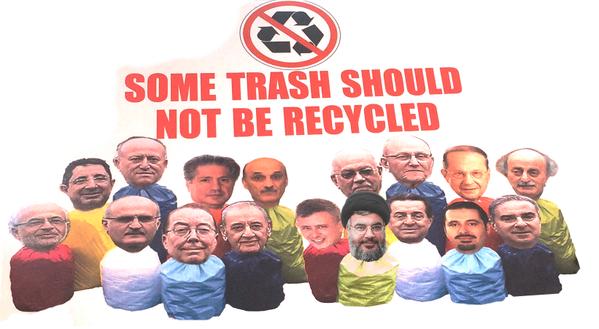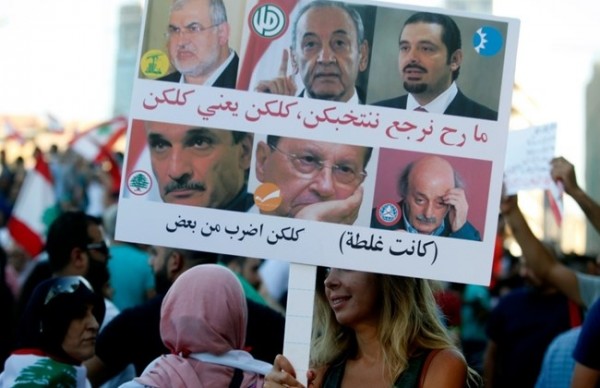
Monthlong street demonstrations in Beirut over uncollected trash are fast turning into a broad grass-roots movement aimed at what was unthinkable here just weeks before: fixing a political system long viewed as corrupt by most Lebanese.
“I can no longer stand them,” Ghada Merhi said of the country’s current political leaders. The 48-year-old homemaker traveled from the southern city of Sidon to Beirut last weekend to join the protests.
Nearby, George Batruni, a 24-year-old graffiti artist, was busy spraying “freedom” in Arabic on temporary walls encircling a construction site. “We need to free ourselves from sectarianism, parties and this old way of thinking,” he said.
For many in this tiny eastern Mediterranean nation of about 4.1 million people, the piles of rotting trash that started accumulating on the streets of the capital and surrounding areas in mid-July was the tipping point. Their anger over garbage has swelled into deep disgust with Lebanon’s politicians over a broad range of grievances.
The gathering wave of dissent is drawing comparisons to the early days of the popular uprisings that erupted elsewhere in the region nearly five years ago. The so-called Arab Spring didn’t blossom in Lebanon then, but now activists say there is a real chance to enact sweeping reforms.
“I have battles, trash is one of them, but in the long run I want to change the system,” saysMarwan Maalouf, one of the leaders of the so-called You Stink movement, which was launched this summer to protest the country’s trash crisis. “We are restoring hope in Lebanon.”
Mr. Maalouf, a human rights lawyer and a longtime civil society activist, was among the some 40 people who occupied the Ministry of Environment in Beirut for several hours on Tuesday before being evicted by police.
The protest at the ministry came hours before the expiration of a 72-hour deadline for the resignation of the environment minister,Mohammed Machnouk, which protest organizers issued during last Saturday’s demonstration in downtown Beirut.
Lebanese blame Mr. Machnouk’s ministry for the garbage crisis, which began when a landfill south of the capital was closed. Since then, the government has repeatedly said it is studying possible solutions to the crisis, while top political figures have failed to agree on even a temporary remedy.

With the gathering momentum of the protests, You Stink has spawned other movements such as We Want Accountability, To The Street and We Are Continuing.
To keep protesters at bay, most government buildings in central Beirut were fortified this week with more steel fences, blast walls and concertina wire. Political leaders are scheduled to convene what they have described as a dialogue round table next Wednesday, the same day You Stink and other movements have called a major protest.
Some politicians, commentators and ordinary Lebanese are predicting the movement won’t amount to much. They cite past attempts at overhauling Lebanon’s political system that have collided with the formidable, sectarian-based economic and feudal interests dominating the country and eventually withered.
They also point to fears that mounting protests could lead to the chaos, wars and extremism that plague most countries of the Arab Spring, especially neighboring Syria. This, they say, could eventually undermine support for the You Stink movement.
Still, the Lebanese representing all religious sects, backgrounds and social classes are more united than during he so-called Cedar Revolution protests in 2005 that followed the assassination of former Lebanese Prime Minister Rafiq Hariri and forced Syria to withdraw its 14,000 soldiers and intelligence personnel from Lebanon.
The number of people gathering in Beirut’s streets to demonstrate in the past six weeks hasn’t approached the throngs of the Cedar Revolution. But unlike those protests, the current demonstrations haven’t split Lebanese between opponents and supporters of Syrian President Bashar al-Assad’s regime.
Since 2005, successive Lebanese governments have failed to improve basic public services like water, electricity and roads. Even as the central government proved ineffectual at addressing basic needs, political leaders with close ties to Iran, Saudi Arabia and other outside powers last year extended parliament’s mandate for the second time, citing security concerns from the war in Syria. The same parliament has been unable to nominate a new president since May 2014.
The paralysis, coupled with endemic corruption and a deteriorating economy, has stirred many Lebanese to take to the streets—and some to song.
In a song titled, “All of You Means All of You” released last week on YouTube, a local band called Al-Rahel Al-Kabir, or the Great Departed, blames all political leaders for the country’s dysfunction, mocking many of them for what it describes as hypocrisy, indifference and even thuggery.
The galvanizing of the protests across Lebanon’s long-standing political, religious and ethnic divides has emboldened many demonstrators to take aim at some of the country’s most politically powerful and socially sensitive groups.
In the past few weeks, more Sunni and Shiite Muslims in Lebanon have spoken out against both the Future Movement, the main Saudi-backed Sunni party, and Iran-backed Hezbollah, accusing them of fomenting sectarian hatred for the sake of their own political agendas.
Hezbollah, whose political bloc is represented in both parliament and the cabinet, has been fighting for years in Syria to prop up Mr. Assad. More than one million Syrian refugees have flowed into the country.
“We mean nothing to them except votes and bodies to defend them,” said Hassan Nabolsi,a 21-year-old Shiite protester from southern Lebanon. Disparities in income and living standards have widened significantly in Lebanon in recent years, and many of Mr. Nabolsi’s friends, he said, are jobless and angry. His brother, who works overseas, supports him.
This resentment and frustration were echoed in a satirical play staged Monday by Ziad Itani, a 40-year-old performance artist and activist who hails from one of Beirut’s main Sunni districts.
“People are realizing they are being manipulated the same way” by their leaders, Mr. Itani said.
Many Sunnis from Akkar, an impoverished area in northern Lebanon, have joined the protests in Beirut.
Ziad Baroud, a former interior minister who resigned from his post in 2011, believes the source of the country’s woes lies in the choice by political leaders to divvy up the country’s economic and political power among themselves instead of rebuilding and strengthening the state following the end of Lebanon’s 15-year civil war in 1990.
“Lebanon needs a spring, we can no longer patch things up,” said Mr. Baroud, who is serving as an adviser to some of the protest leaders. “Something fundamental has to change.”
WSJ

Leave a Reply
You must be logged in to post a comment.